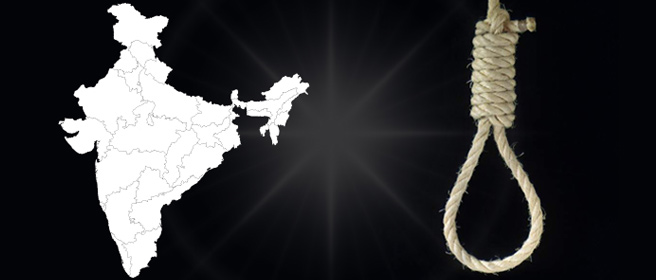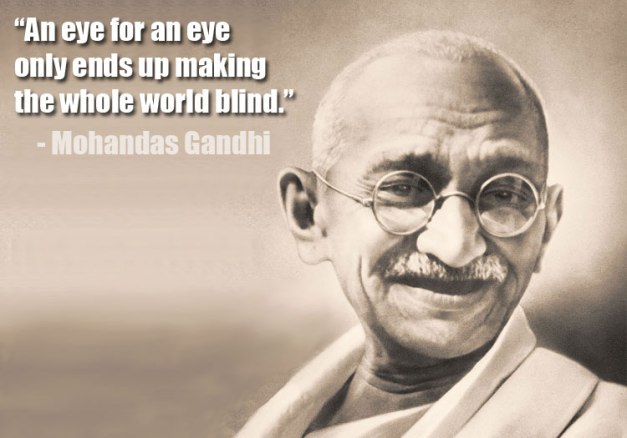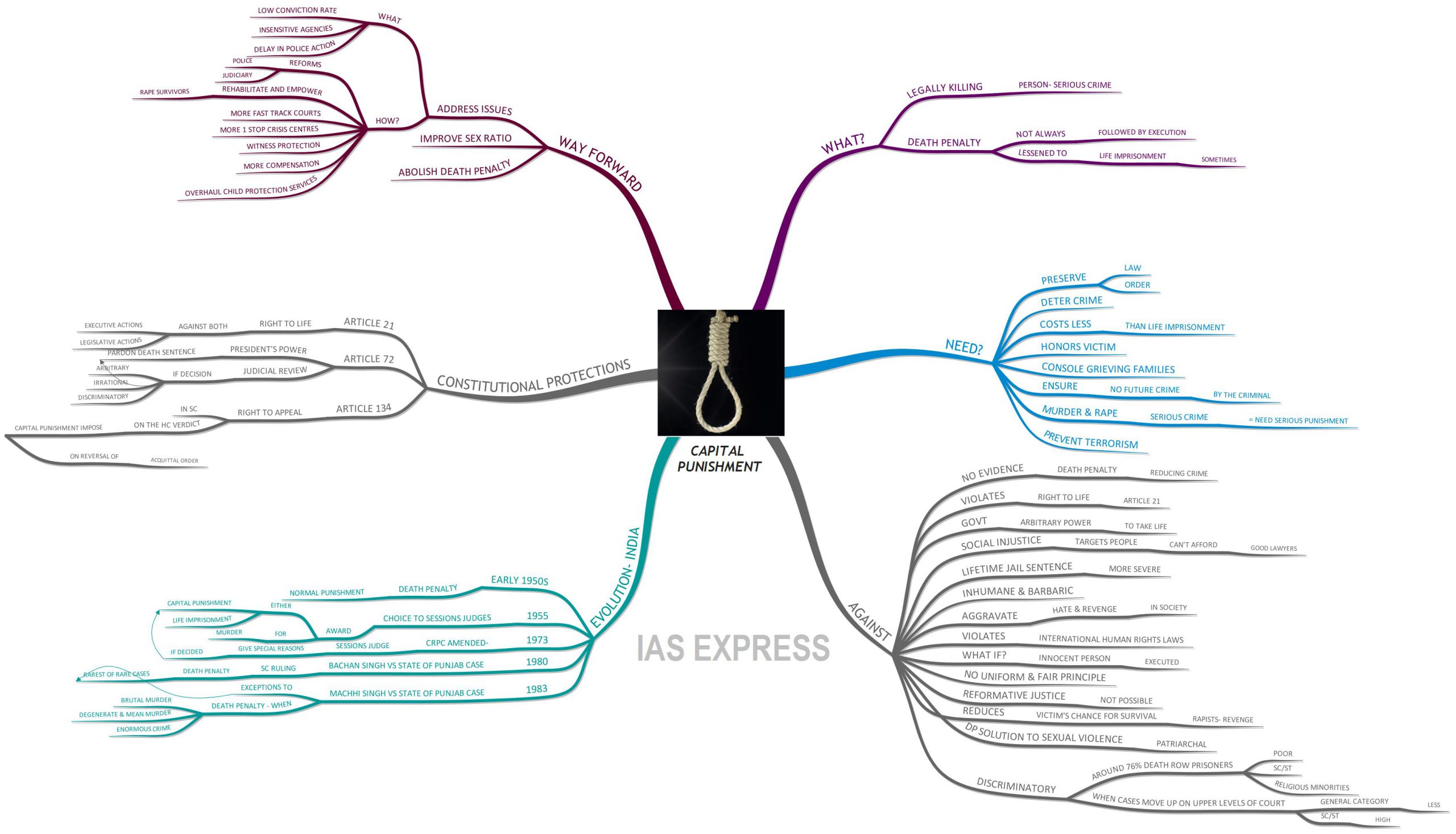Capital Punishment in India – Should we do away with it?

Updates *
There is growing support for abolishing capital punishment in India and it needs serious consideration since, on the other side, there has been a nationwide outrage over the series of incidents of sexual assaults of minor girls, like the one in Kathua. The Supreme Court itself admitted on many occasions that there are confusion and contradiction on the application of the death penalty.
What is capital punishment?
- Capital punishment is the punishment which involves the legal killing of a person who has committed a serious crime such as murder.
- The term Death Penalty is sometimes used interchangeably with Capital Punishment, even though the imposition of the death penalty is not always followed by execution due to the possibility of commutation to life imprisonment.
What is the need for capital punishment? / Arguments in favour? / Why India still retains it?

- Capital punishment is an important instrument for preserving law and order, deterring crime and costs less than life imprisonment.
- Retributive justice or “an eye for an eye” honours the victim, helps console grieving families and guarantees that the perpetrator never has an opportunity to cause future tragedy.
- Death sentence serves as a deterrent for other criminals as well.
- A guilty must be punished with respect to the severity of the crime. Murder and rape are very severe crimes = death penalty must be imposed on such crimes.
- The death penalty is needed in law books to contain terrorism. It forms part of the national response against terrorist activities.
- The death penalty provides much-needed closure for the victims’ families.
What are the arguments against the death penalty?

- There is no sufficient evidence to prove that the death penalty is any more effective in reducing crime than imprisonment. Notably, Brutal rapes in India have not decreased despite the enforcement of the Criminal law (Amendment) Act, 2013 which prescribes the death penalty and life imprisonment for sexual assaults that result in the victim dead or being reduced to a persistent vegetative state.
- It gives arbitrary power to the government for taking a human life = violation of the right to life guaranteed under Article 21 of the constitution.
- It aggravates social injustices by targeting people who cannot afford good lawyers.
- Lifetime jail sentences are more severe and less expensive punishment than death.
- Human rights activists argue that it is inhumane and barbaric to sentence the criminals with the death penalty.
- The death penalty is like murdering criminals as revenge. What if the perpetrator has also murdered a person for revenge? = Imposing the death penalty makes the government as well as the citizens murderers.
- Death sentence violates international human rights laws.
- As the death sentence is irrevocable, an innocent person can also be wrongly executed.
- There is no uniform and fair principle on the execution of convicts on death row.
- There are 3 major objectives of punishment i.e., retribution, reformation, and deterrence. The theory of reformation is based on the obligation of society to reform a convicted person. But this objective will be entirely defeated in case of capital punishment since the offender does not continue to live.
- It reduces the chances of survival of the victim. For example, the death penalty would motivate rapists to do more harm to the victims.
- The populist death penalty solution to curb sexual violence is highly patriarchal which overemphasize the sexual aspect of the assault and strengthen the stigma associated with rape.
- As per the law commission report, around 76% of death row prisoners were from poor, backward classes and religious minorities. And when cases move up on higher levels of courts, the percentage of general category prisoners fell and the percentage of SC and ST prisoners increased. This is discriminatory and against the principle of the right to equality and Equal protection of Law. *
What is the evolution of the death penalty in India?
- The death penalty remained as the normal punishment for murder during the first 5 years after the constitution was made (1950).
- It was changed in 1955 when a choice was given to sessions judges to award either of the two sentences for murder i.e., capital punishment or life imprisonment.
- Accordingly, the Criminal Procedure Code (CrPC) was amended in 1973 by which Parliament declared that special reasons shall be given by the Sessions judge if she decided to impose the death penalty on the convicted person.
- Later on, in the Bachan Singh vs. State of Punjab case 1980, SC ruled that death penalty could be imposed only in “rarest of rare cases” in which the life imprisonment cannot be imposed.
- Machhi Singh vs. State of Punjab case 1983 provided exceptions to the rarest of rare rule and death penalty can be invoked when
- Murder is committed in an extremely brutal manner = aroused extreme outrage of the community.
- Murder is committed with a motive of expressing total degeneracy and meanness.
- The crime is enormous in proportion.
What are the protections against capital punishment under the constitution?
- Article 21 – It provides the right to life for citizens and gives them protection not only against executive actions but also against the legislation.
- Article 72 – President can pardon even the death sentence, while the governor cannot under Article 161. Even when the pardon was denied to a death row criminal, there is scope for judicial review if the presidential decision is arbitrary, irrational and discriminatory.
- Article 134 – Under this, the right to appeal the high court verdict in the Supreme Court in any case where capital punishment was imposed on an accused in the reversal of acquittal order.
- Hence the treatment of death row convicts has been humanized under the constitution itself.
What is the way forward?
Issues which need to be addressed
- Delay in police action: Unwarranted delay by police in filing missing person complaints and registering written complaints of sexual assault survivors is one of the major factors for the rising number of crimes without any deterrence.
- Insensitive agencies: Many sexual harassment cases tend to come under the media spotlight only in extreme cases, such as the one where a child, after being sexually assaulted and left bleeding, was kept waiting for hours at a civil hospital in March 2018.
- Low conviction rate: It is the main reason that contributes to the culpability of rapists and nurtures the growing impunity with which sexual crimes are committed. This reality is well captured in National Crime Records Bureau data that unveils high figures of repeat sexual offenders.
- Hence India’s growing rape culture is best reversed by improving conviction rates via reforms in the police and judicial systems, and by increasing measures to rehabilitate and empower rape survivors. The government should allocate more resources towards establishing fast-track courts, more one-stop crisis centres, proper witness protection, more expansive compensation for rape survivors and the overhaul of current child protection services.
Improving sex ratio
India’s murder rate has declined constantly since 1961 and is at present the lowest in our recorded history except for 1963. Studies prove that a more equal sex ratio resulted in a declining murder rate than capital punishments.
Abolishing the death penalty
- Although the Law Commission recommended the abolition of the death penalty for ordinary crimes, activists argue for abolishing it altogether.
- Abolishing the death penalty will also save the long-term litigation involved in murder cases.
- It is high time that the Supreme Court decide whether the lack of political will for the abolition of the death penalty is enough ground to violate the right to life guaranteed under Article 21.
If you like this post, please share your feedback in the comments section below so that we will upload more posts like this.



Useful information
thank you